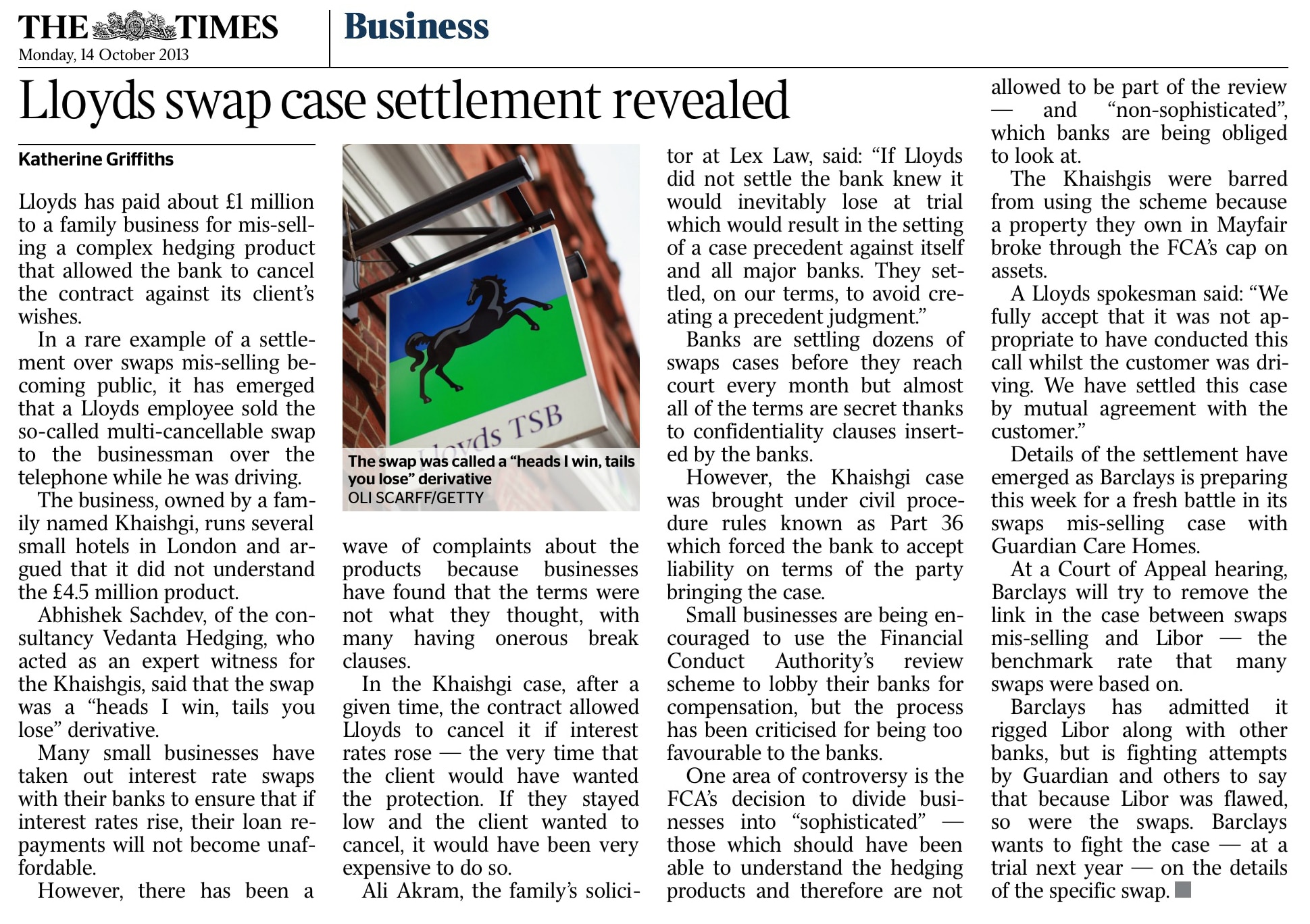Katherine Griffiths, of The Times newspaper, reports on our Financial Services Litigation team’s recent success in a swaps mis-selling litigation case where a speculative financial instrument, namely a multi-cancelable swap, was sold to an SME by Lloyds bank. The bank refused to compensate their customers until the family instructed us earlier this year and we commenced legal proceedings.
Lloyds has paid about £1 million to a family business for mis-selling a complex hedging product that allowed the bank to cancel the contract against its client’s wishes.
In a rare example of a settlement over swaps mis-selling becoming public, it has emerged that a Lloyds employee sold the so-called multi-cancellable swap to the businessman over the telephone while he was driving. The business, owned by a family named Khaishgi, runs small hotels in London and argued that it did not understand the £4.5 million product.
Abhishek Sachdev, of the Derivatives Expert consultancy Vedanta Hedging, who acted as an expert witness for the Khaishgis, said that the swap was a “heads I win, tails you lose” derivative.
Many small businesses have taken out interest rate swaps with their banks to ensure that if interest rates rise, their loan repayments will not become unaffordable. However, there has been a wave of complaints about the products because businesses have found that the terms were not what they thought, with many having onerous break clauses.
In the Khaishgi case, after a given time, the contract allowed Lloyds to cancel it if interest rates rose — the very time that the client would have wanted the protection. If they stayed low and the client wanted to cancel, it would have been very expensive to do so.
M. Ali Akram, the family’s solicitor at LEXLAW, said:
“If Lloyds did not settle the bank knew it would inevitably lose at trial which would result in the setting of a case precedent against itself and all major banks. They settled, on our terms, to avoid creating a precedent judgment.”
Banks are settling dozens of swaps cases before they reach court every month but almost all of the terms are secret thanks to confidentiality clauses inserted by the banks. However, the Khaishgi case was brought [in fact settled] under civil procedure rules known as Part 36 which forced the bank to accept liability on terms of the party bringing the case.
Small businesses are being encouraged to use the Financial Conduct Authority’s review scheme to lobby their banks for compensation, but the process has been criticised for being too favourable to the banks. One area of controversy is the FCA’s decision to divide businesses into “sophisticated” — those which should have been able to understand the hedging products and therefore are not allowed to be part of the review — and “non-sophisticated”, which banks are being obliged to look at.
The Khaishgis were barred from using the scheme because a property they own in Mayfair broke through the FCA’s cap on assets [in fact they were incorrectly classified by their bank several years ago as intermediate customers and Lloyds used this, their own error, to their own advantage to avoid paying compensation in the redress scheme].
A Lloyds spokesman said:
“We fully accept that it was not appropriate to have conducted this call whilst the customer was driving. We have settled this case by mutual agreement with the customer.”
Details of the settlement have emerged as Barclays is preparing this week for a fresh battle in its swaps mis-selling case with Guardian Care Homes. At a Court of Appeal hearing, Barclays will try to remove the link in the case between swaps mis-selling and Libor — the benchmark rate that many swaps were based on.
Barclays has admitted it rigged Libor along with other banks, but is fighting attempts by Guardian and others to say that because Libor was flawed, so were the swaps. Barclays wants to fight the case — at a trial next year — on the details of the specific swap.
Businesses that have suffered as victims of swaps mis-selling are encouraged to consider their legal options immediately – good cases lead to settlement and expert swaps mis-selling lawyers can put forward good cases in a way designed to encourage early settlement.

